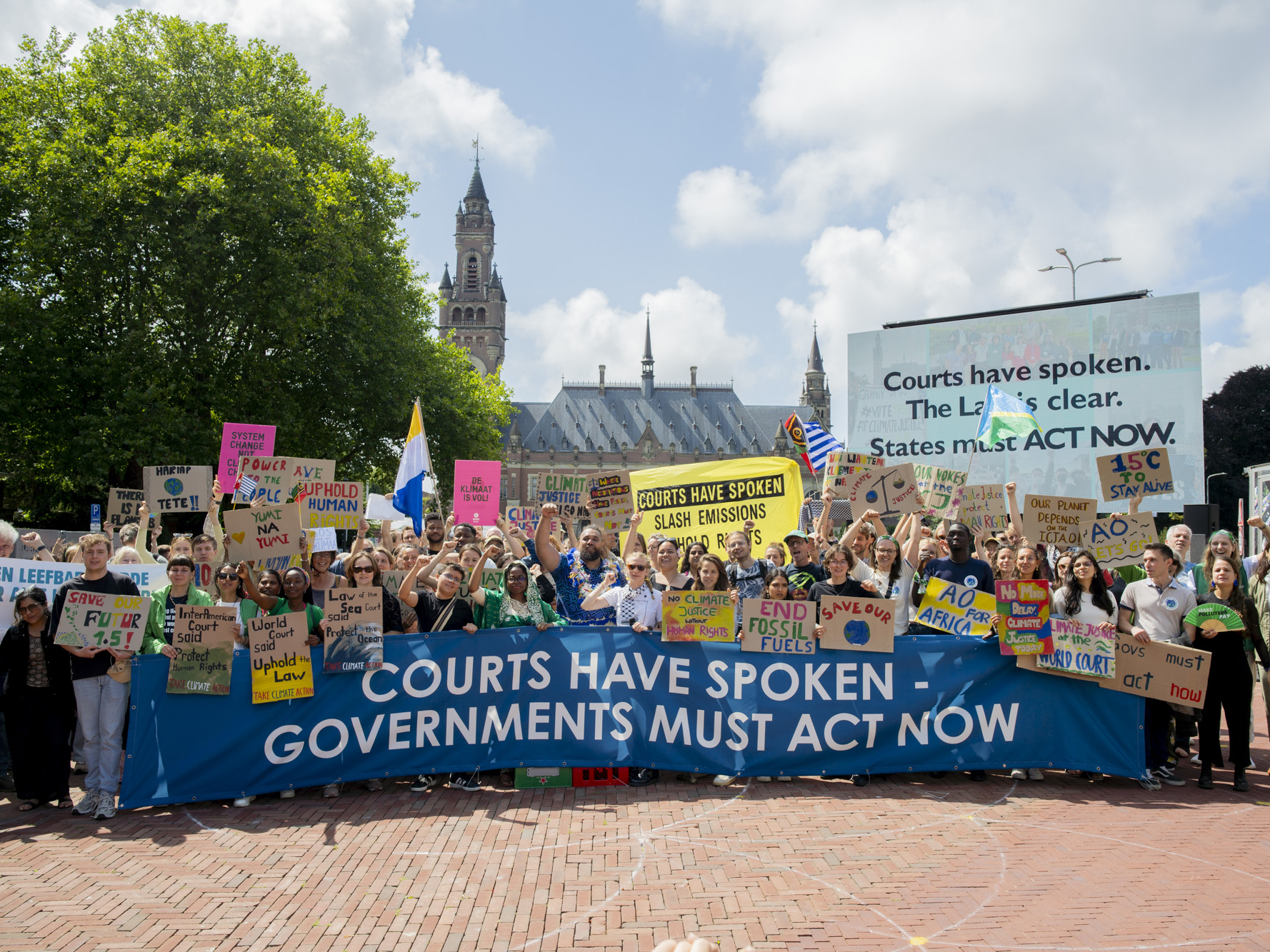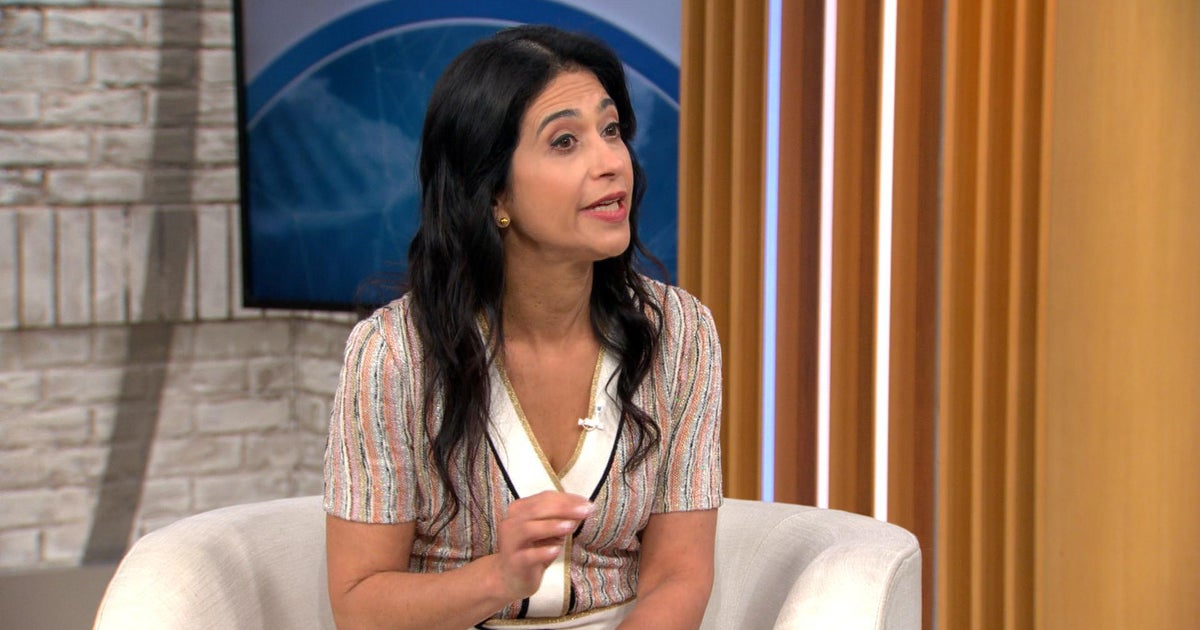By the Loss and Damage Collaboration
24/7/25

A solidarity march and watch party is held by the Pacific Island Students Fighting Climate Change and Worlds Youth for Climate Justice (WYCJ) outside the International Court of Justice in the Hague, Netherlands, as the Advisory Opinion on the obligations of States with respect to climate change is delivered on the 23rd of July at 15:00 CEST / GMT+2. (Teo Ormond-Skeaping / Loss and Damage Collaboration)
The International Court of Justice (ICJ) delivered its much anticipated advisory opinion on the obligations of States with respect to climate change on the 23rd of July. The historic ICJ climate advisory proceedings resulted from the relentless efforts of the Pacific Islands Students Fighting Climate Change (PISFCC), the Worlds Youth for Climate Justice (WY4CJ) and a core group of states led by Vanuatu following the unanimous adoption of a resolution to request the advisory opinion was unanimously adopted at the UN General Assembly on March 29th, 2023.
The Advisory Opinion has been widely hailed as a critical victory for climate justice. But what does it mean for Loss and Damage? Here are our initial takeaways.
What were the questions posed to the ICJ?
The Advisory Opinion was requested by the General Assembly in resolution 77/276, which posed two fundamental questions:
- What are the obligations of States under international law to ensure the protection of the climate system and other parts of the environment from anthropogenic emissions of greenhouse gases for States and for present and future generations?
- What are the legal consequences under these obligations for States where they, by their acts and omissions, have caused significant harm to the climate system and other parts of the environment, with respect to:
- States, including, in particular, small island developing States, which due to their geographical circumstances and level of development, are injured or specially affected by or are particularly vulnerable to the adverse effects of climate change?
- Peoples and individuals of the present and future generations affected by the adverse effects of climate change?”
The official request to the ICJ was delivered through a letter from the United Nations Secretary General on April 12th, 2023. The proceedings got underway in 2024. In the “written phase” 91 written statements and 62 written comments were provided by states and international organisations by the 15 August deadline. Oral hearings began later that year, with 96 states and 11 international organisations providing oral statements from December 2nd to 13th. The hearings took place in the shadow of a profoundly disappointing outcome on the New Collective Quantified Goal on Climate Finance (NCQG) and other agenda items at COP 29 in Baku, Azerbaijan.
What were the answers to these questions and how do they relate to Loss and Damage?
In answering question (a) on the obligation of States under international law, the court unanimously found the following:
The climate change treaties, including the UNFCC and its Paris Agreement and Kyoto Protocol set forth binding obligations for Parties to ensure the protection of the climate system and other parts of the environment from anthropogenic greenhouse gas emissions (GHGs). These obligations include the following (see our notes on how this relates to Loss and Damage in brackets):
- Parties (i.e. states that have ratified these treaties) to the UNFCCC have an obligation to adopt measures to contribute to climate change mitigation and adaptation. (Rapidly reducing emissions is essential for averting loss and damage, while providing finance and support for adaptation in developing countries at the scale of the needs is crucial to minimise loss and damage that is already locked in).
- Parties listed in Annex I to the UNFCCC (such as the United States, UK, Canada, Germany and other developed countries) have additional obligations to take the lead in combating climate change by limiting their GHGs and enhancing their greenhouse gas sinks and reservoirs. (Rich countries from the Global North are responsible for the lion's share of emissions and the subsequent loss and damage that they have caused. They can and must rapidly phase out all fossil fuels in a just and equitable manner to avert greater amounts of future loss and damage).
- Parties to the UNFCCC have a duty to cooperate with each other in order to achieve the underlying objective of the Convention. (Rich countries must provide finance and other elements of support, such as technology and capacity building, at the scale and scope needed).
- Parties to the Kyoto Protocol must comply with applicable provisions of the Protocol (The Kyoto Procal legally bound rich Global North countries to emission reduction targets. Whilst the Protocol has been superseded by the Paris Agreement as the primary international treaty governing global efforts to combat climate change, it is technically still in force and makes clear the obligations of rich Global North Countries to take the lead in reducing emissions to avoid future loss and damage to the extent possible).
- Parties to the Paris Agreement have an obligation to act with due diligence in taking measures in accordance with their common but differentiated responsibilities and respective capabilities (CBDR-RC) capable of making an adequate contribution to achieving the temperature goal set out in the Agreement. (The court confirmed that upholding the goal of limiting global average warming to 1.5°C was the principal aim of Parties under the Paris Agreement. This is not just an arbitrary target but a survival limit set to prevent existential loss and damage such as the loss of the territory of entire island nations and the collapse of critical systems such as healthcare. In line with CBDR-RC, rich polluting countries from the Global North should provide climate finance at scale needed by Global South countries for mitigation).
- Parties to the Paris Agreement have an obligation to prepare, communicate and maintain successive and progressive Nationally Determined Contributions (NDCs) which, when taken together, are capable of achieving the temperature goal of limiting global warming to 1.5°C. (Current NDCs put the world on track for a catastrophic 2.5-2.9°C of warming by 2100, risking existential loss and damage to communities and countries on the front lines of the climate crisis. Disappointingly, over 90 percent of countries failed to make their submissions for the third round of NDCs (NDC 3.0) by the February 10th deadline, leading to an extension. And even though Parties agreed to transition away from fossil fuels at COP 28, little progress has been made on mitigation and fossil fuel exploration has since increased with rich polluting countries from the Global North leading fossil fuel expansion. This ruling should see NDCs with the highest ambition (i.e. 1.5°C aligned NDCs) delivered ahead of COP 30).
- Parties to the Paris Agreement have an obligation to pursue measures which are capable of achieving the objectives set out in their successive NDCs. (Vanuatu and others have included costed Loss and Damage contributions in their NDCs. Paragraph 5 of the NCQG decided that rich Global North States should deliver climate finance to support the implementation of NDCs by Global South States including Loss and Damage contributions. The ruling makes clear the obligation of rich Global North States to provide finance for the implementation of Loss and Damage NDC’s under the NCQG).
- Parties to the Paris Agreement have obligations for adaptation and co-operation, including through technology and financial transfers, which must be performed in good faith. (Adaptation finance is woefully inadequate with a gap of 359 billion USD per year despite States in the Global South calling repeatedly for a tripling of adaptation finance, which is inscribed in decision 1/CMA.3. Furthermore, under Article 8 of the Paris Agreement Global North States have obligations to provide support including finance for Loss and Damage. Yet, despite this they have strongly resisted any mention of liability and compensation and any obligation to provide Loss and Damage finance. This includes the United States. demanding that a paragraph (paragraph 51, Decision 1/COP21) be added to the Paris Agreement to “agree’ that Article 8 of the Agreement does not involve or provide a basis for any liability or compensation and the voluntary nature of the contributions that rich Global North States are “invited” to make to the Fund for Responding to Loss and Damage (FRLD) (see paragraph 13 of Decision 2/CP.27 and 2/CMA.4). This ruling therefore makes clear that rich Global North States have obligations to provide Loss and Damage finance in good faith and should end push back e.g. that Loss and Damage finance will be provided under the NCQG).
The Court also found that customary international law sets forth obligations for States to ensure the protection of the climate system and other parts of the environment from anthropogenic greenhouse gas emissions. These obligations include the following:
- States have a duty to prevent significant harm to the environment by acting with due diligence and to use all means at their disposal to prevent activities carried out within their jurisdiction or control from causing significant harm to the climate system and other parts of the environment, in accordance with their CBDR-RC. (The court ruled that preventing significant harm required ending fossil fuel production, consumption, licensing or subsidies and the regulations of corporations causing harm within a state's territory and that failure to do so would represent an international wrongful act. This addresses the root cause of the climate crisis, where the UNFCCC and its Paris Agreement had failed to mention fossil fuels as the principal cause and make crystal clear the obligation of states to rapidly phase out fossil fuels to avert loss and damage. It also makes clear the obligation of rich Global North states to provide support, including finance to Global South States for adaptation and Loss and Damage to prevent harm).
- States have a duty to cooperate with each other in good faith to prevent significant harm to the climate system and other parts of the environment, which requires sustained and continuous forms of co-operation by States when taking measures to prevent such harm. States parties to the Vienna Convention for the Protection of the Ozone Layer and to the Montreal Protocol on Substances that Deplete the Ozone Layer and its Kigali Amendment, the Convention on Biological Diversity and the United Nations Convention to Combat Desertification in Those Countries Experiencing Serious Drought and/or Desertification, Particularly in Africa, have obligations under these treaties to ensure the protection of the climate system and other parts of the environment from anthropogenic greenhouse gas emissions. States parties to the United Nations Convention on the Law of the Sea have an obligation to adopt measures to protect and preserve the marine environment, including from the adverse effects of climate change and to co-operate in good faith. States have obligations under international human rights law to respect and ensure the effective enjoyment of human rights by taking necessary measures to protect the climate system and other parts of the environment. (It is significant that the court ruled that States have obligations under international law outside of the climate treaties, with the inclusion of human rights law of particular importance for Loss and Damage. Recognising that States have obligations to ensure the enjoyment of human rights by protecting the climate system has implications across the spectrum of averting (through mitigation), minimising (through adaptation) and addressing loss and damage. Reinforcing that rich Global North countries must provide support including finance to Global South countries to adapt and respond to loss and damage including by filling and replenishing the FRLD with the at least 400 billion USD that it needs to disburse annually and ensuring that the Santiago Network for Loss and Damage has sufficient resources to provide technical assistance to Global South states to put in place policies and plans to respond to loss and damage.)
In answering question (b) the court found the following:
A breach by a State of any obligations identified in response to question (a) constitutes an internationally wrongful act entailing the responsibility of that State. The responsible State is under a continuing duty to perform the obligation breached. The legal consequences resulting from the commission of an internationally wrongful act may include the obligations of:
- Cessation of the wrongful actions or omissions, if they are continuing (I.e. States are obligated to rapidly phasing out fossil fuels to halt emissions to avert loss and damage);
- Providing assurances and guarantees of non-repetition of wrongful actions or omissions, if circumstances so require (States must provide assurances and guarantees that they will return to fossil fuel extraction and consumption, the phase-out must be for ever); and
- Full reparation to injured States in the form of restitution, compensation and satisfaction, provided that the general conditions of the law of State responsibility are met, including that a sufficient direct and certain causal nexus can be shown between the wrongful act and injury. (This is a big win for Loss and Damage, whilst the Inter American Court on Human Rights (IAMCHR) included a strong ruling on reparations, it was unclear if the ICJ would be brave enough to do the same. The ruling means that rich Global North States can be held to account for the Loss and Damage they have caused by Global South States in courts of law but also reaffirms the obligations that rich Global North States have under the UNFCCC and Paris Agreement to fill the FRLD and provide other finance and support for Global South States to respond to loss and damage).
Does the Advisory Opinion go far enough?
The court adopted the Advisory Opinion unanimously, this is only the fifth time that this has happened in the nearly 80 years of the ICJ’s existence. That said, some judges felt that the Advisory Opinion was not strong enough and submitted separate opinions and/or declarations.
Vice President of the ICJ, Judge Sebutinde argued, in a separate opinion, that the Advisory Opinion fell short in several ways, including a failure to provide clarity in the context of the legal implications of climate change of States for present and future generations and Least Developed Countries (LDCs) and Small Island Developing States (SIDS). Judge Sebutinde argued that the Advisory Opinion does not acknowledge the imbalance between high emitting States and those who have contributed very little to climate change, yet bear the brunt of its impacts: the crux of climate (in)justice. The Advisory Opinion also fails to stress the obligation of states to protect vulnerable communities, those whose habitat, culture and way of life are fundamentally altered by climate change nor the obligation of states to ensure a sustainable and equitable world. As such, the Advisory Opinion did not engage with climate justice, which Judge Sebutinde argued was at the heart of the request from the General Assembly. In doing so, the Advisory Opinion downplayed the fact that high income States in the Global North have used more than their fair share of the carbon budget while lower income States in the Global South have used much less than their fair share yet are more greatly impacted by climate change. Their over use of the carbon budget is in fact one of the primary reasons why States in the Global North became right and yet they argue that poorer countries from whom they have profited should have the same obligations. Sebutinde stressed that CBDR-RC should have been more “thoroughly explored”.
In another separate opinion, Judge Yusuf argued that the legal avenues for those most affected by climate change —particularly LDCs and SIDS— should have been analysed and argued that the Court, missed an “historic opportunity” to clarify what the legal consequences of a failure of high emitting states to take "appropriate actions to save the planet.” Judge Xue also underscored the importance of “historical justice and fairness” in the separate opinion they submitted, arguing that CBDR-RC is the foundation of international cooperation in the context of climate change and that the distinction between “developing” and “developed” countries is critical. Judge Xue provided an in-depth analysis of CBDR-RC and climate justice in the context of the questions posed to the court and it’s worth reading.
From these supplementary documents, it is evident that, as strong as the Advisory Opinion is, there was clearly scope and a desire for it to have gone even further in articulating the legal consequences for states of violating their obligations vis-a-vis climate change. This is important as it demonstrates that there can be no rollback but only a strengthening of the argument for reparations. We will likely see this word more frequently in our work on Loss and Damage, along with the term “compensation”. Both words have been sidelined because they are unpalatable to rich countries in the Global North who hold more power and sway in the UNFCCC process. But that has changed with the Advisory Opinion. We are in a new era. Rich States in the Global North will no longer be able to escape obligations as easily and with as much impunity as they have done so for the past three decades.
What’s next?
We will be following up with a more in depth analysis in due course with an outline of the role the Advisory Opinion will play in Loss and Damage relevant discussions and agenda items in the lead up to and at COP 30. In the meantime, we would like to thank everyone who made this a reality. First and foremost we’d like to thank the Pacific Islands Students Fighting Climate Change for starting the campaign in the first place and the World Youth for Climate Justice for taking it up. We’d also like to thank the Center for International Environmental Law for all their efforts to drive the campaign and for always keeping us updated on not only this Advisory Opinion but others as well as climate litigation cases across the world. Thank you all for creating a space and inviting us into it. We’ve been enriched by working with you all so far and we hope to collaborate more with you.
We would like to express our extreme gratitude to Vanuatu for its efforts in driving the campaign and for the many other States that championed it along the way to ensure it got space in the UN General Assembly. Thank you to the many lawyers and legal experts, researchers, academics, activists and campaigners and all the other amazing folks who worked tirelessly to make this outcome possible. We are profoundly grateful to you all.
And finally, we’d like to thank the Court itself and especially the leadership of President Judge Iwasawa Yuji. You have all provided an act of service to the world in delivering this Advisory Opinion. Now it’s up to the rest of us to take it forward, to make meaning of it, to ensure it is implemented and to hold rich States in the Global North accountable, so that together, we can create the kind of world we all want to live in and leave for future generations. One in which all humans, all other species and all ecosystems are thriving on a healthy planet. We look forward to working with you to do just that.

















 English (US) ·
English (US) ·